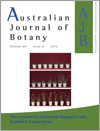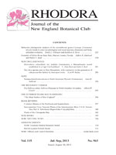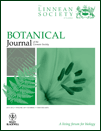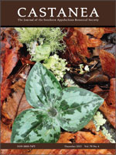
Botany
Scope & Guideline
Fostering global knowledge in plant sciences.
Introduction
Aims and Scopes
- Plant Taxonomy and Systematics:
Research on the classification, naming, and evolutionary relationships of plants, which includes both traditional morphological studies and modern molecular techniques. - Ecological Interactions and Plant Communities:
Investigations into the interactions between plants and their environment, including studies on plant communities, ecological restoration, and the impact of environmental changes on plant diversity. - Physiological and Morphological Studies:
Examinations of plant physiology, including growth patterns, reproductive strategies, and adaptations to various environmental conditions. - Conservation Biology and Ethnobotany:
Research dedicated to the conservation of plant species, their habitats, and the role of plants in human culture, including traditional uses and sustainable practices. - Fungal and Symbiotic Relationships:
Studies focusing on the interactions between plants and fungi, including mycorrhizal associations and endophytes, which are crucial for understanding plant health and ecology.
Trending and Emerging
- Climate Change Impact Studies:
Research examining how climate change affects plant phenology, distribution, and community dynamics is on the rise, signaling an increasing awareness of environmental challenges. - Urban Ecology and Green Infrastructure:
The exploration of plant communities in urban settings and the implementation of green infrastructure for biodiversity and ecosystem services are gaining traction. - Genomic and Molecular Approaches:
There is a growing emphasis on genomic studies, including transcriptomics and metabolomics, to understand plant responses to environmental stressors and for enhancing plant breeding programs. - Plant-Microbe Interactions:
The investigation of plant interactions with microbial communities, including endophytes and mycorrhizae, is increasingly recognized for its role in plant health and resilience. - Ethnobotanical Research:
The study of traditional plant uses by Indigenous peoples and the integration of ethnobotany into conservation and sustainable practices is becoming more prominent.
Declining or Waning
- Invasive Species Research:
Although still relevant, there has been a noticeable decrease in studies specifically focused on invasive plant species and their management compared to previous years. - Traditional Morphological Studies:
Research relying solely on classical morphological techniques for species identification and classification is becoming less frequent, as molecular methods gain prominence. - Agricultural Plant Studies:
The focus on traditional agricultural species and their management appears to be waning, possibly due to a shift towards more sustainable and ecological approaches in agriculture.
Similar Journals

Alpine Botany
Connecting Ideas in Alpine Ecology and Botany.Alpine Botany is a premier scholarly journal published by SPRINGER BASEL AG, dedicated to the field of ecological and botanical research with a specific focus on alpine environments. With an ISSN of 1664-2201 and an E-ISSN of 1664-221X, this journal has established itself as a significant platform for disseminating high-quality research findings, with its latest category rankings placing it in the Q1 quartile for both Ecology, Evolution, Behavior and Systematics as well as Plant Science. Originating from Switzerland, Alpine Botany benefits from its geographical context, fostering a rich exchange of ideas and research advancements relevant to high-altitude flora. The journal operates under an Open Access model, promoting widespread accessibility of its content while accommodating an increasing demand for interdisciplinary studies within the ecological and botanical communities. With a commitment to excellence, Alpine Botany continues to serve as an invaluable resource for researchers, professionals, and students who are keen to explore and understand the complexities of alpine ecosystems.

NEW ZEALAND JOURNAL OF BOTANY
Bridging Theory and Practice in Ecological StudiesThe New Zealand Journal of Botany, published by the esteemed Taylor & Francis Ltd, serves as a pivotal platform for disseminating significant research in the fields of Ecology, Evolution, Behavior and Systematics, as well as Plant Science. With a rich history dating back to 1963 and an impressive convergence extending to 2024, this journal has established itself as an essential resource for researchers and professionals dedicated to understanding the complexities of plant life and ecological systems in New Zealand and beyond. The journal is currently categorized in the Q3 quartile for both relevant disciplines as of 2023, reflecting its balanced influence within the global academic community. Although not an open access journal, it retains a significant impact factor, evidenced by its Scopus rankings, which place it within the top half of its categories. This makes it an invaluable tool for students, researchers, and academics aiming to engage with robust, peer-reviewed scientific findings and contribute to the evolving discourse surrounding botany and ecological research.

AUSTRALIAN JOURNAL OF BOTANY
Advancing plant sciences for a sustainable future.The Australian Journal of Botany is a prestigious peer-reviewed journal published by CSIRO PUBLISHING, dedicated to advancing the field of plant sciences and ecology. Established in 1953, this journal provides a critical platform for researchers to share original research findings, reviews, and perspectives in subjects ranging from plant biology to ecological interactions, with a focus on Australian flora and its conservation. With an impressive impact factor and categorized in the Q3 quartile in both Ecology, Evolution, Behavior and Systematics and Plant Science, the journal ranks competitively within its fields, allowing authors to reach a diverse audience of professionals, students, and fellow researchers. The journal is accessible in print and electronically through its ISSN: 0067-1924 and E-ISSN: 1444-9862, providing wider access to vital research outcomes that influence environmental policies and natural resource management. As it aspires towards innovation and excellence, the Australian Journal of Botany remains an essential resource for those passionate about the richness of plant biodiversity and ecological understanding.

RHODORA
Nurturing Insights in Botanical StudiesRHODORA, published by the New England Botanical Club Inc, is a prominent journal dedicated to the field of botany, specifically focusing on Horticulture and Plant Science. With a rich history dating back to its founding years and ongoing publication from 1995 to 2024, this journal serves as a vital platform for disseminating research, reviews, and advancements in botanical studies. Though classified in the Q4 quartile for both horticulture and plant science in 2023, RHODORA remains an essential resource for researchers and practitioners, providing insights into plant ecology, conservation, and cultivation practices. While it does not offer Open Access options, the journal's commitment to quality research in a highly specialized field makes it a significant contributor to the botanical sciences, fostering collaboration and innovation among scholars and professionals in the United States and beyond.

TURKISH JOURNAL OF BOTANY
Innovating the future of plant research.Welcome to the TURKISH JOURNAL OF BOTANY, a prestigious publication dedicated to advancing the field of plant science. Established in 1990 and published by the Tubitak Scientific & Technological Research Council Turkey, this journal serves as a vital platform for researchers, professionals, and students to disseminate their findings and insights on various botanical topics. With an impressive H-index that underscores its academic influence and recognition in the field, the journal is positioned in the Q2 quartile of plant science according to the latest category rankings. The ISSN of the journal is 1300-008X and the E-ISSN is 1303-6106, ensuring broad accessibility in both print and digital formats. As of 2023, it ranks #213 out of 516 in Scopus for Agricultural and Biological Sciences, placing it in the 58th percentile, which highlights its competitive standing among botanical journals. Researchers are encouraged to engage with its open-access options where available, fostering a collaborative and accessible research environment. With its commitment to quality and scientific rigor, the Turkish Journal of Botany remains an essential resource for anyone engaged in the exploration of plant sciences.

NORDIC JOURNAL OF BOTANY
Pioneering Insights in Ecology and SystematicsNORDIC JOURNAL OF BOTANY, published by WILEY, is a distinguished journal that serves as a vital platform for the dissemination of innovative research in the fields of Plant Science and Ecology, Evolution, Behavior and Systematics. With an ISSN of 0107-055X and E-ISSN 1756-1051, this journal has been a crucial part of the academic landscape since its inception in 1981, continuing to contribute significantly to the literature up to 2024. NORDIC JOURNAL OF BOTANY holds a commendable Q2 ranking in Plant Science and Q3 in Ecology, which underscores its impact and relevance in the scientific community. Despite the absence of Open Access options, the journal offers robust access features that ensure researchers and readers can easily engage with its meticulously curated content. Aimed at both seasoned professionals and emerging scholars, the journal not only publishes high-quality articles but also fosters collaboration and knowledge exchange across various related disciplines, thereby solidifying its role as a cornerstone in botanical and ecological research.

BOTANICAL JOURNAL OF THE LINNEAN SOCIETY
Cultivating Insights into Plant Biology and EcosystemsThe Botanical Journal of the Linnean Society, published by Oxford University Press, stands as a premier platform for interdisciplinary research within the realms of Ecology, Evolution, Behavior, and Plant Science. With a notable impact factor reflective of its esteemed reputation, this journal is classified in the Q1 quartile for both Ecology and Plant Science, placing it among the most influential publications in these fields. Since its inception in 1969, and with an anticipated convergence of research extending to 2024, it has become essential for scholars and professionals seeking to engage with cutting-edge studies, theoretical frameworks, and practical applications that drive our understanding of plant biology and ecological systems. The journal’s commitment to excellence is underscored by its robust Scopus rankings—achieving an impressive 83rd percentile in Ecology and a 82nd percentile in Plant Science. This makes the Botanical Journal of the Linnean Society a crucial resource for researchers, educators, and students alike, eager to advance their knowledge and contribute to the evolving discourse in botany and environmental studies.

BANGLADESH JOURNAL OF BOTANY
Fostering Interdisciplinary Insights in BotanyBANGLADESH JOURNAL OF BOTANY is a prominent publication in the field of plant sciences, dedicated to advancing research and knowledge within the botanical community. Published by the BANGLADESH BOTANICAL SOC, this journal serves as a vital platform for researchers and scholars seeking to disseminate their findings related to plant biology, ecology, and conservation practices, particularly within the unique context of Bangladesh's diverse flora. With an ISSN of 0253-5416 and an E-ISSN of 2079-9926, the journal encompasses a wide scope of topics, reflecting interdisciplinary approaches in botanical research. Since its inception, with convergence periods from 1996 to 2001 and from 2003 to 2024, it has garnered recognition, positioned in the Q4 category in the Plant Science field with a ranking of #459/516 in Scopus, indicating its contribution to the field despite its developing impact. Operating within Bangladesh, at the UNIV DACCA DEPT BOTANY, the journal provides a crucial insight into the ecological and agricultural implications of plant studies in the region, catering to the needs of academics, professionals, and students eager to engage with contemporary botanical research.

ACTA SOCIETATIS BOTANICORUM POLONIAE
Nurturing Knowledge in the Botanical SciencesACTA SOCIETATIS BOTANICORUM POLONIAE is a reputable open-access journal dedicated to the field of Plant Science, published by the Polskie Towarzystwo Botaniczne since 1923. With an ISSN of 0001-6977 and an E-ISSN of 2083-9480, this journal has made significant contributions to the botanical sciences, fostering the dissemination of research from Poland and beyond. The journal has ranked in the third quartile (Q3) within its category in the 2023 journal metrics, demonstrating a strong presence in the global academic community, as evidenced by its Scopus ranking of 291/516 within the Agricultural and Biological Sciences sector, placing it in the 43rd percentile. While specific H-Index data are currently not available, ACTA continues to attract submissions from a broad international audience and publishes a wide range of studies that advance the understanding of plant biology, ecology, and conservation. The journal remains a vital resource for researchers, professionals, and students alike, committed to enhancing knowledge and collaboration in botanical science.

CASTANEA
Exploring the Rich Biodiversity of Trees and EcologyCASTANEA is a distinguished journal published by the SOUTHERN APPALACHIAN BOTANICAL SOCIETY in affiliation with NEWBERRY COLLEGE. With an ISSN of 0008-7475 and an E-ISSN of 1938-4386, this esteemed publication serves as a vital platform for researchers and practitioners in the field of Plant Science. It has been circulating since 1982, and its scope focuses on the study of trees, their ecology, and conservation, thereby contributing significant insights into the biodiversity of the Southern Appalachian region and beyond. Despite its current ranking in the Q4 quartile and the 5th percentile in the Scopus Agricultural and Biological Sciences category, CASTANEA is committed to advancing knowledge and fostering a deeper understanding of plant sciences among academics and students alike. The journal does not currently offer Open Access options, maintaining a traditional subscription model that allows for carefully curated and peer-reviewed content. As you explore the advances in plant biology through CASTANEA, you will find an invaluable resource that supports both emerging and established scholars in their research endeavors.